Billy Joel bassist on being a “bass player for hire” and the once-in-a-lifetime performance with Sir Paul
Exclusive interview with FBPO’s Jon Liebman
Nov. 29, 2021
Andy Cichon slings his bass for the Piano Man himself, Billy Joel. The Australian-born musician has been a part of Joel’s band, on and off, for two decades now and is also well known for his work with country singer Shania Twain. Over the years, Andy’s also played with Rose Tattoo, Five for Fighting, Billy Thorpe, James Reyne, Judge Mercy, Dragon, and Icehouse. Beyond that, Cichon is a founding member of the alt-country/Americana band Shotgun Wedding, which also features drummer Chuck Burgi from Billy Joel’s band.
FBPO: I know your dad was very influential in your initial exposure to music. Tell me about those early days and how you ended up becoming a bass player.
AC: He was an amateur musician, piano player, trumpet, violin… and played in marching bands and stuff. He grew up in Berlin, Germany, and I think came out on the boat with that horn. He got me started on classical piano, when I was about 6. He gave me some lessons. In Australia, we’ve got a very formal classical program, which you can start at a young age. I went to the Elder Conservatorium of Music, basically every six months, for formal classical piano exams and theory exams from the age of 8 to 15. He would sit by me and count time. In fact, my first gig was playing bass in a little dance band of his, pretty much reading my way through Herb Alpert tunes. I taught myself guitar. I can obviously read both clefs and so it was like, “Son, it’s just an octave lower.” And so that was my first bass gig playing, “So What’s New” and “Tijuana Taxi.”
FBPO: Who were your influences? What bass players got your attention?
AC: I was a rock and roll kid. I always liked big guitars and stuff like that. Initially it was always McCartney, because the first real album I ever owned … my Aunt Margaret gave me a copy of A Hard Day’s Night soundtrack, in mono. And that sits in my studio now, signed by the man himself. So that had to be, just through osmosis, that had to be a major influence. I lived and breathed that record for years, followed by the Essential Beatles. It was like a “Best Of” record. So it had to be McCartney, McCartney, McCartney. And then because I was a rocker, I loved Thin Lizzy. I loved the way that Phil Lynott could sing and completely remove what he was doing, bass-wise, from the syncopated vocals he was putting on top. I thought that was an amazing skill. I was always a vocalist as well, so I found that to be an incredible talent. But then I got serious at 18 and I stopped gigging and locked myself away. And then it was Stanley Clarke first, Jaco, Brand X, Percy Jones. At the time, I was really also loving what Pino Palladino was doing, Anthony Jackson on all the Al Di Meola records. But my favorite fusion album was a Brand X album called Masques, which is kind of strange because that was the first album that Phil Collins did not play drums on. He was replaced by Chuck Bergi, who is now Billy Joel’s drummer.
FBPO: What do you mean when you say you got serious?
AC: Just that I got into my little moment of fun confusion, where I was always, and I really am still, a pop guy, a pop rock guy. But the first time I heard that sound, I’m like, “What is that? What is slap?” I think the bass fill in the middle of The Brothers Johnson song “Stomp,” I’m like, “What is that noise?” And so I just went into this instrumental … I love Jeff Beck, I love some Jan Akkerman solo albums. I just sort of got into a fusion trip for three years and really tried to think about technique. And it wasn’t just about standing in front of the mirror with whatever the latest bass I bought and adjusting it to where it looked the coolest. I was pretty much a pick player up until then. It was a Ricky 4001 pick acoustic amp. And I just realized there was more to it, taking nothing away from Paul’s sense of melody and placement. For instance, “Something,” that tune, how to play a whole lot and never get in the way of the vocal. I think, it’s just brilliant.
FBPO: You’ve got a signed record from him. Did you meet him?
AC: July 18th of 2008. We were with Billy Joel. We were playing the last play at Shea. It was the very last night before they blew Shea stadium up. And we had done the 16th and the 18th with a bunch of different special guests. And, we weren’t even aware that McCartney was coming that night. He was in Europe and it didn’t look like … Obviously Billy and him are friends and it would’ve been great to have him do the last night at Shea. Thinking back to Shea, what year was it?
FBPO: ’65, I think.
AC: That year. And as it turned out, the stars aligned and he made it with a little bit of help of the NYPD. I’m sworn in as a US citizen that morning, July 18th at 7:30. I’m in my suit at local Brooklyn Borough Hall with my wife going, “Oh, this U.S. caper thing kind of worked out okay.” Tonight I’m playing Shea stadium, there’s going to be a bunch of special guests that night, Tony Bennett, Steven Tyler, a bunch of other people. We got to soundcheck and there was just a rumor that perhaps McCartney might make it. So we ran a couple of tunes. We ran, “I Saw Her Standing There” and “She Loves You,” just in case. I said, “But I’m going to be on that stage somewhere because that’s my hero.” So we come off stage, we’re about to do the encore. He’s like, “Paul, what do you want to do? It’s all about you.” McCartney goes, “How about ‘Let It Be?'” And so I go, “Excuse me, Sir Paul, will you be playing piano or bass on ‘Let It Be?'” He goes, “Oh, I thought I’d play piano.” And so Billy is like, “I’ll just sit on the piano and do background vocals.” And so I grabbed a bass. We winged it, we hadn’t played it. It was only 60-odd-thousand people there. And so we did it and to this day, it’s still magic. I still can’t believe that, that moment happened. It was just a wonderful, wonderful moment. Probably the highlight of my career, getting to play with my hero.
FBPO: Billy’s got such a big catalog. Do you find yourself pretty much sticking to the bass lines that are on the records or have you modified them over time?
AC: It’s not my position to reinvent the wheel, and some of those lines are integral to the songs. Things like “Moving Out,” which are a very regimented thing, why would you ever change that? Or things that mimic his hand very closely, say “My Life.” The one song I have messed with is, there’s a tune called “Big Man on Mulberry Street.” Actually, Ron Carter plays the upright bass breakdown in the middle of the upright breakdowns.
FBPO: I didn’t know that.
AC: And the thing with that song is, I walk the main tag. It feels like it needed it. And he was like, “I hired you because I like the way you play. You do whatever you want.” I think being a more mature player means that you realize what shouldn’t be messed with.
FBPO: Tell me about your basses.
AC: I actually started out on an Ibanez jazz copy. It was my first good bass. And I’ve just found one again and bought one, just for the hell of it. A ’75 Ibanez jazz, in nice shape actually. As a young kid, a 15-year-old, I had a ’66 P bass and then a Ricky, and I kept the Rickenbacker which was a bad decision. And sold … made a $300 profit on my ’66 P bass. But I played Warwick bass for many years, I’d be remiss not to mention that because they were very good to me and very supportive for a long time. When I turned pro, which was 1984, I was playing Australian basses called Matons, which are more known for their acoustic guitars. Now Tommy Emmanuel plays Maton. That was my first bass. And then I used old Yamahas for a long time. Those early ’80s, BB400S Yamahas, which are great, as are their late ’70s acoustic guitars. I have a bunch of those too. I did a little stint on Music Mans for a time, when the Ernie ball Music Mans came out, but unless you kicked it in the midrange, you got lost in the mix. And then I switched to Warwick.
FBPO: When did you start playing Foderas?
AC: I got rained on at Jazz Fest in New Orleans, I think 2008 or 2009, when we played it, and my maple cap neck on my 5-string Warwick delaminated. Me, with just way too much gumption goes, “Well, this is a serious repair. I’m going to take it to the guys at Fodera.” Like, I’m going to take it, an opposition company’s instrument, to them. And Vinny Fodera, we hit it off instantly. We went around the shop, banging on bits of wood, talking about our philosophies and tone. And I told him why I like maple cap necks, why I like underwound pickups. And, he was completely, on the same page. I played some Foderas, but I had never played that. Well, it’s like, “Is this me?” It was like that. I’d been very loyal to Warwick for all those years, but I got home and I was literally waking up in the middle of the night, thinking about playing Foderas.
FBPO: Are you primarily a 5-stringer? A 4-stringer?
AC: I play 5-string under duress. [Laughs] It’s very rare that I found a 5-string instrument that sounds as good on the E, A, D and G string as a 4-string instrument. The Fodera comes closest. Also considering the music that I play mainly, a lot of it wasn’t recorded on five-string. I find so many players head down the bottom, almost too readily. And I can find that it creates too much of a chasm between where the bass is sitting in the rest of the band. There seems to be a gap and I don’t like getting too far away from my bandmates, onstage or tonally. I’ll play it, and on the last Shania Twain tour, I think I played nothing but 5-string, and certainly when I was out doing stuff with her in Vegas in 2013. And that Fodera, one thing I’ll say about that bass it is … and the brief that I had with Vinny is like, one bass for any gig. I prefer to play 4-string. I’m a traditionalist, really. Give me a P Bass and Ampeg SVT and I’m good to go.
FBPO: You mentioned that you were a pick player way back. What about now? What would you say the balance is between playing with a pick and playing with your fingers?
AC: Whatever the song calls for. Absolutely, whatever the song calls for. As part of reviewing some of Billy’s stuff, before we went back out to start doing shows, I reviewed a bunch of stuff and realized that, “Oh, that’s played with a pick rather than with fingers.” So I switched. It’s never too late to learn and to adapt, so I went to pick on a couple of things. If I’m playing rock or hard rock, it’s going to be with a pick. It’s going to be eighth note, down strokes, P Bass, SVT. But with Billy, it’s more a finger gig. It was with Shania Twain as well. And there’s a couple of times I got to bring out the thumb. I am a bass player for hire. As we mentioned before about not straying far away from the original recordings, if it was recorded with a pick, the producer said, “I want to hear the aggression of the pick,” so I’ll play it with a pick. Do I feel like I’ve got more control with fingers? Yes, especially right-hand of course. But there’s a certain tone that comes with a pick. Again, it’s all about whatever the song calls for, Jon. It’s not about me going, “This is the way I play, take it or leave it.” I’m being paid to do a job and I’m going to do it to the best of my ability and with some sense of humility. It’s not my band, it’s not my tunes. They’re not my bass parts.
FBPO: What advice do you have for someone who wants to learn bass? What do you think is important?
AC: This has always been my philosophy: Play the low notes, play them in time with the drummer, and stay out of the way of the lead vocal as Mr. McCartney used to do. It’s not a show pony instrument. I always find that being in a band is almost the ultimate form of socialism, if you will. It’s not about me or him or the drummer or the vocalist. It should really be about the team. It’s the sum of the parts that matters. So to new players, I’m like, “If you want to play with your buddies, you should be a team player first and foremost.” Unless you get to the point where you want to start playing fusion and go for it. But if you want to play some classic rock or some whatever, then really enjoy playing with other musicians. It’s teamwork. It’s not about you, the individual, you can do that on your own, in your basement or in your bedroom. Eventually that gets old, but boy, playing a simple groove well with a drummer, to me it’s just joyous.
FBPO: What would you be if you weren’t a bass player?
AC: Probably a racing driver. I’m an absolute maniacal Formula One Grand Prix fan. I’m also crazy about golf. I wish I would’ve applied myself to that at a much earlier age. But I love what I do. I’m so lucky, so fortunate.
See Jon’s blog, with key takeaways from this interview here.
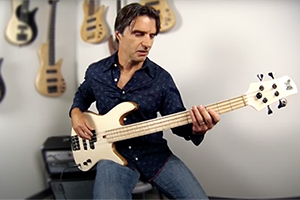


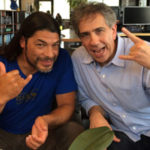
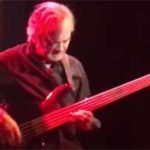
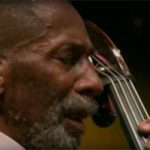

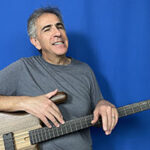
Ich habe mit Begeisterung den Artikel von Andrew Cichon gelesen.
Er ist mein Cousin und ich habe Ihn immer bewundert.
Grüße Christian Teichert
I read Andrew Cichon’s article with enthusiasm.
He’s my cousin and I’ve always admired him.
Greetings Christian Teichert
🙂